All Categories
Featured
Regular tire turnings are a vital yet frequently ignored facet of car upkeep. This easy procedure, which involves altering the placement of your tires, helps maintain also put on throughout all four tires, inevitably improving your vehicle's performance and durability. Let's discover the significance of tire turnings and the tangible benefits they provide.
What Is a Tire Rotation?
![]()
Tire turning involves moving the tires to various positions on your vehicle. As an example, the front tires may be switched with the rear ones, or they might be crossed from one side of the car to the other. The rotation pattern depends upon elements like your car's drivetrain (front-wheel drive, rear-wheel drive, or four-wheel drive) and the kind of tires you use.
Why Are Routine Tire Turnings Crucial?
Tire rotations make certain that all tires put on down equally. Because various tires experience differing degrees of stress based on their placement, irregular tire wear occurs naturally. For instance:
Front tires on front-wheel-drive lorries take care of more tasks like steering, braking, and acceleration, triggering them to use quicker.
Rear tires on rear-wheel-drive lorries bear comparable problems, resulting in unequal wear patterns if left uncontrolled.
![]()
Without normal rotations, some tires may break too soon, necessitating replacement faster than anticipated.
Advantages of Routine Tire Turnings
Boosted Efficiency and Handling. Also tire wear aids keep well balanced grip across all 4 tires. This balance is crucial for ideal lorry handling, specifically in difficult driving problems such as rainfall or snow.
Extended Tire Life Expectancy. Normal turnings disperse wear even more evenly, lowering the demand for frequent replacements and saving you money over time.
![]()
Improved Fuel Effectiveness. Unevenly worn tires can enhance moving resistance, forcing your engine to work tougher and take in more gas. Effectively rotated tires make sure smoother rides and much better fuel economic climate.
Safety and security. Worn tires concession hold and braking efficiency, raising the threat of accidents. Rotating your tires on a regular basis maintains consistent step depth and makes sure a more secure driving experience.
How Usually Should You Revolve Your Tires?
Most specialists advise revolving your tires every 5,000 to 7,500 miles, but this can differ based on your vehicle's producer guidelines. It's a great technique to combine tire turnings with regular services like oil modifications for comfort.
Signs You Required a Tire Rotation
Uneven step endure your tires.
Visible resonance while driving.
Difficulty dealing with the vehicle on wet or unsafe roads.
Final Thoughts
Normal tire rotations are a basic yet impactful maintenance job that boosts car efficiency, improves safety, and conserves you cash. By committing to this practice, you'll appreciate a smoother driving experience and a much longer life expectancy for your tires. Consult your car's handbook or a relied on mechanic to guarantee you're adhering to the appropriate rotation routine and pattern for your vehicle.
What Is a Tire Rotation?

Tire turning involves moving the tires to various positions on your vehicle. As an example, the front tires may be switched with the rear ones, or they might be crossed from one side of the car to the other. The rotation pattern depends upon elements like your car's drivetrain (front-wheel drive, rear-wheel drive, or four-wheel drive) and the kind of tires you use.
Why Are Routine Tire Turnings Crucial?
Tire rotations make certain that all tires put on down equally. Because various tires experience differing degrees of stress based on their placement, irregular tire wear occurs naturally. For instance:
Front tires on front-wheel-drive lorries take care of more tasks like steering, braking, and acceleration, triggering them to use quicker.
Rear tires on rear-wheel-drive lorries bear comparable problems, resulting in unequal wear patterns if left uncontrolled.

Without normal rotations, some tires may break too soon, necessitating replacement faster than anticipated.
Advantages of Routine Tire Turnings
Boosted Efficiency and Handling. Also tire wear aids keep well balanced grip across all 4 tires. This balance is crucial for ideal lorry handling, specifically in difficult driving problems such as rainfall or snow.
Extended Tire Life Expectancy. Normal turnings disperse wear even more evenly, lowering the demand for frequent replacements and saving you money over time.

Improved Fuel Effectiveness. Unevenly worn tires can enhance moving resistance, forcing your engine to work tougher and take in more gas. Effectively rotated tires make sure smoother rides and much better fuel economic climate.
Safety and security. Worn tires concession hold and braking efficiency, raising the threat of accidents. Rotating your tires on a regular basis maintains consistent step depth and makes sure a more secure driving experience.
How Usually Should You Revolve Your Tires?
Most specialists advise revolving your tires every 5,000 to 7,500 miles, but this can differ based on your vehicle's producer guidelines. It's a great technique to combine tire turnings with regular services like oil modifications for comfort.
Signs You Required a Tire Rotation
Uneven step endure your tires.
Visible resonance while driving.
Difficulty dealing with the vehicle on wet or unsafe roads.
Final Thoughts
Normal tire rotations are a basic yet impactful maintenance job that boosts car efficiency, improves safety, and conserves you cash. By committing to this practice, you'll appreciate a smoother driving experience and a much longer life expectancy for your tires. Consult your car's handbook or a relied on mechanic to guarantee you're adhering to the appropriate rotation routine and pattern for your vehicle.
Latest Posts
Learn About Best Car Repair Care offered by Montclare Auto Repair – Drive with Confidence
Published May 29, 25
1 min read
Explore Best Car Repair Care from Montclare Auto Repair – Expert Care for Your Vehicle
Published May 28, 25
1 min read
Boost Your Residential Property with Overhead Door Equipment
Published May 24, 25
1 min read
More
Latest Posts
Learn About Best Car Repair Care offered by Montclare Auto Repair – Drive with Confidence
Published May 29, 25
1 min read
Explore Best Car Repair Care from Montclare Auto Repair – Expert Care for Your Vehicle
Published May 28, 25
1 min read
Boost Your Residential Property with Overhead Door Equipment
Published May 24, 25
1 min read